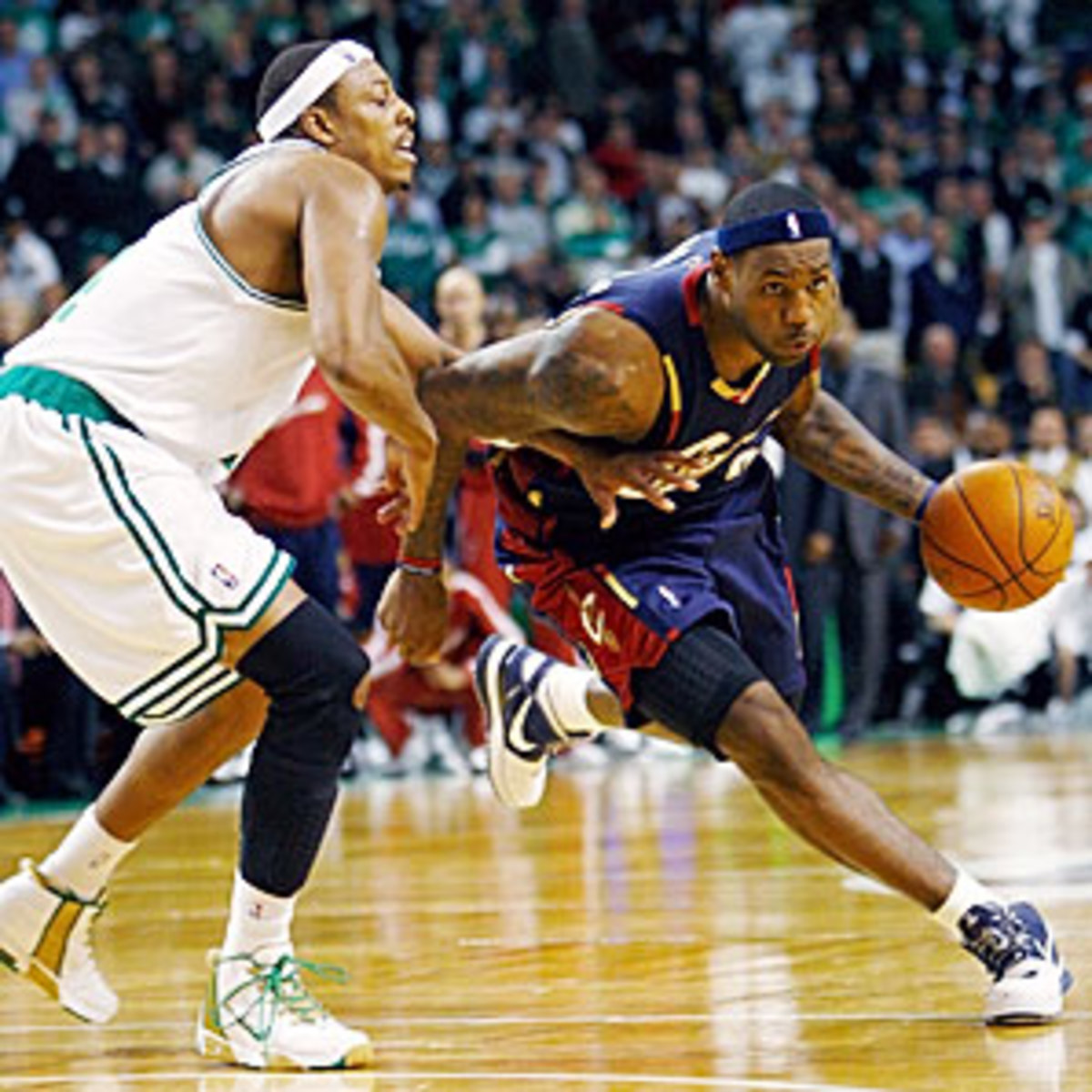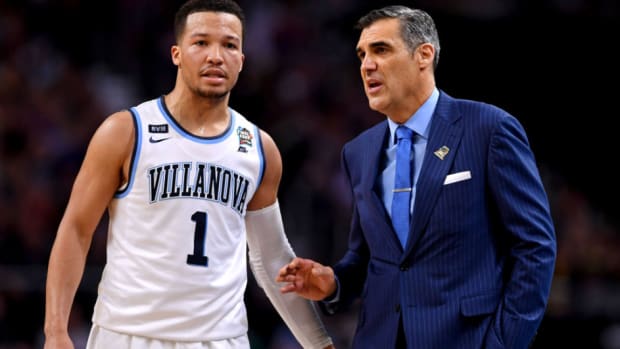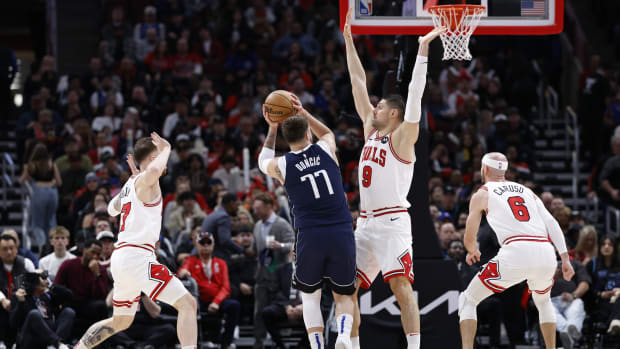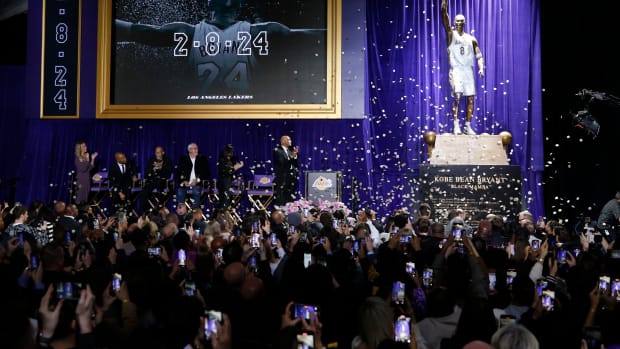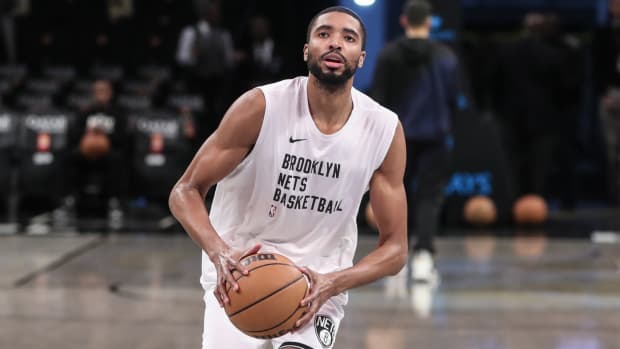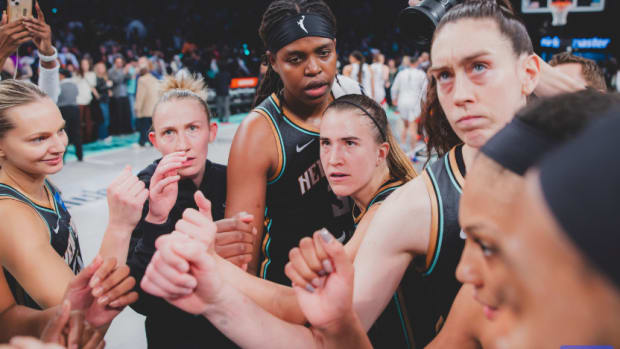Roundtable: Sizing up the best
1. The Celtics (23-2), Lakers (20-3) and Cavaliers (20-4) have winning percentages of .833 or better, with the Magic (19-6) next at .760. How do you evaluate the pecking order at the top of the league?
Ian Thomsen: Those first three are the class of the league at this early moment, and the winning percentages reflect the relative strengths. The Celtics are No. 1, and they're playing defensively as well as they did last season in the NBA Finals. It's a positive sign for the Lakers that they've gone 20-3 while incorporating their new defensive style around Bynum and Pau Gasol up front. Cleveland is a frightening No. 3 contender that has improved since its Game 7 loss to Boston in the Eastern Conference semifinals last season. The Cavs are excellent at both ends of the floor, and LeBron James is playing like a bigger version of Kobe Bryant and Michael Jordan. Which is frightening.
Jack McCallum: I consider the Celtics a clear No. 1. The phrase "in a class by themselves" is a bit strong, but they are clearly better than the Lakers, if only considering the result of last June's Finals. At this point, I put the Lakers 2 and the Cavs 2A, because there's not too much separating them. The Magic aren't as good as any of the top three.
Chris Mannix: A lot of NBA types I've talked to believe the Celtics and Lakers are on a collision course for the Finals. I agree. L.A. is head and shoulders above anyone in the West right now. Boston is healthy (Ray Allen, in particular), hungry (a championship has only further fueled Paul Pierce) and clicking on all cylinders. But Cleveland is playing frighteningly well. Celtics owner Wyc Grousbeck told me recently that he considered LeBron "the scariest player in the league" and is nervously anticipating a Celtics-Cavs rematch in the playoffs.
Cleveland is especially dangerous this season because of its defense. Scouts and coaches say the Olympics have changed LeBron -- "He's defending the best player on the opposing team every game," an Eastern assistant coach said -- while Mo Williams, a half-hearted defender in Milwaukee, has provided solid, game-to-game defense (in addition to scoring 16 points a game).
Steve Aschburner: I like those teams in the order listed -- Celtics, Lakers, Cavs, Magic -- but that's right now. By the time the playoffs start, the Lakers could improve, the Cavs could improve a lot and the Magic could improve a whole lot, closing any gap between themselves and the defending champs. I suppose it's the age of the Celtics' three key guys that makes them seem a little more fragile -- that, and the more difficult task of maintaining their excellence rather than scaling a new height. Calling out the second unit, as the team's veterans have been doing, might be the ace up their figurative sleeves those guys need. Also, I keep reminding myself that if Kevin Garnett, Ray Allen or Paul Pierce gets hurt, Boston still has two left. L.A., Cleveland or Orlando wouldn't be able to say that should its franchise guy go down.
***
2. Assuming you believe that the Lakers are a clear-cut No. 1 in the West right now, who is the second-best team in that conference?
Thomsen: They trail the second-place Nuggets by 1½ games in the West, but the Spurs are L.A.'s main challenger. Since its 1-4 start, San Antonio has gone 14-4 while working Manu Ginobili and Tony Parker back into the rotation. Roger Mason, George Hill, Matt Bonner and Ime Udoka all have the look of traditional Spurs role players. The Spurs will enjoy being the underdog all season to the Lakers, and -- health permitting -- a playoff series between the teams would be far more interesting than last year's, when San Antonio's bench was older and Ginobili was injured.
McCallum: It might be stubbornness talking since I picked New Orleans to win the whole shebang before the season started, but I'm going to say the Hornets. They seem to have righted themselves after a slow start and they've already got two three-game road trips behind them, though a four-gamer looms in early January.
Mannix: I'm sticking with New Orleans. The Hornets learned valuable lessons in last season's second-round loss to San Antonio, lessons that will carry over in the 2009 postseason. The core of the team -- Chris Paul, Peja Stojakovic, David West and Tyson Chandler -- is now battle-tested.
Aschburner: "Second best'" seems like a label that suits San Antonio at this point, now that the Spurs have their guys back and can find a groove that will work when "second best'' no longer matters. Early injuries to Manu Ginobili and Tony Parker allowed coach Gregg Popovich to put more responsibility on Roger Mason, George Hill and even Matt Bonner, and their firmed-up roles off the bench will allow Popovich to manage the main guys' minutes, with occasional heroics from the reserves. My curiosity about the Spurs, frankly, is how well golden oldies Bruce Bowen and Michael Finley play even in their much more limited capacities.
3. Phoenix continues to tinker, the latest example being the acquisition of Jason Richardson. What's your assessment of Steve Kerr's makeover of the Suns since taking over as general manager before last season?
Thomsen: It all depends how you look at it. If you call this the kind of team he has been aiming to create, then of course his vision is hopeless. But that isn't fair because, in fact, the roster is still in transition. The Suns are on their way to becoming something different and altogether new.
Steve Kerr took over a team with a coach and star players who were far more established in their roles than Kerr was in his as a new GM. Everyone faces a steep learning curve in this job. I remember the rash moves made by Danny Ainge after he was hired to run the Celtics, and they are the kinds of decisions you don't see him making today. The Suns' window was closing when Kerr was hired, and he made a bold gamble by trading for Shaquille O'Neal in hopes of grabbing a championship before too late. Instead, that deal hastened a transition that so far has drawn in Mike D'Antoni as well as Raja Bell and Boris Diaw. And it isn't finished yet.
McCallum: Steve Kerr is having trouble defining exactly what his team's identity is. Run with Steve Nash? Walk it up and dish to Shaquille O'Neal? Let Amaré Stoudemire touch it 50 times a game? Perhaps Kerr's acquisition of Richardson will once and for all stamp the Suns as a get-up-and-go team ... as long as coach Terry Porter buys into it.
Mannix: I'm not a fan of what Steve Kerr has done in Phoenix. He effectively pulled the plug on a wildly successful open-court offense when he traded hyperkinetic forward Shawn Marion for the lumbering Shaquille O'Neal last February. He alienated the core of the team when he allowed the popular Mike D'Antoni to walk away after last season. The more conventional style of his handpicked replacement, Terry Porter, has prompted grumbling from several players.
The acquisition of Jason Richardson, an athletic scorer who should fit in nicely next to Steve Nash, and Jared Dudley, a versatile forward capable of playing multiple positions, should give the Suns a boost, but they are light years away from being considered contenders. That's a big concern when you consider that the franchise's cornerstones, Nash and Amaré Stoudemire, can walk away after next season.
Aschburner: Steve Kerr is a bright guy and he's so self-effacing that he tends to beat you to any criticism. But Phoenix appears to be mired in some one-step-forward, half-step-back time warp. Acquiring Jason Richardson was a move for points and faster pace, two things the Suns had pushed down their priority list. Boris Diaw, whose breakthrough season (2005-06) is looking more like Brady Anderson's 50-home run fluke, was due to go, but if Raja Bell isn't going to be your individual lockdown defender, a la Bruce Bowen, James Posey or Ron Artest, come playoff time, who is? Enough fiddling and fussing already. Kerr needs to let this group seek its level and accept the fact that this season, rise or fall, is on him.
***
4. The NBA has had six coaching changes since the start of the season. What gains can a bad team expect to make by firing a coach?
Thomsen: Some of these teams -- Oklahoma City, Minnesota and now Sacramento, who happen to occupy the bottom of the West -- had no chance of making the playoffs, but wanted to provide a new voice to their young players in hopes of staving off bad habits and attitudes. The Wizards, Raptors and 76ers viewed themselves as playoff teams and were anxious to stop the early-season decline. But none of these teams hired a replacement with the experience of Hubie Brown, who knew how to reorganize and inspire the Grizzlies when he was hired by Jerry West years ago. So all six of these teams are basically in limbo, which is to say that none should be expecting dramatic improvement.
McCallum: In most of these cases, management is simply trying to solidify the fan base, providing the perception that Hey, we're doing something! Also, firing a coach has saved many a general manager his job.
Mannix: I asked a few NBA front-office officials this same question and they all had the same answer: You have to look at it in a case-by-case basis. So, let's do that.
Philadelphia: GM Ed Stefanski hopes Tony DiLeo, who has limited coaching experience but shares Stefanski's up-tempo philosophy, will find a way to make the Sixers a consistent running team.
Washington: The Wizards (believe it or not) have yet to abandon their hopes of making the playoffs. Ed Tapscott told me that he and GM Ernie Grunfeld are hoping that by making defense a priority, the Wizards will be able to salvage the season.
Minnesota: The conventional wisdom is that Kevin McHale is in a sink-or-swim situation: He has to find a way to win this season or start updating his résumé. That's very possible. But if Minnesota shows signs of improvement, owner Glen Taylor wants this to be the first of hopefully many seasons with McHale on the bench. In many ways, the rest of this season will be about evaluating McHale as a coach.
Oklahoma City: The Thunder were bad with P.J. Carlesimo. They will continue to be bad under Scott Brooks. I get the impression that GM Sam Presti isn't overly concerned about winning this season as long as Brooks gives the young core the opportunity to develop.
Sacramento: See Oklahoma City. The young Kings are a non-factor in this year's playoff race. GM Geoff Petrie needs to evaluate a team that hasn't tuned out its coach.
Toronto: Raptors GM Bryan Colangelo told me that he loved Jay Triano's offensive philosophies. Colangelo will use the last five months of the season to see if Triano has the makeup to be an NBA coach. Of all the interim coaches, Triano probably stands the best chance to keep the job.
Aschburner: My sense is that any bump at the box office is brief and largely dependent on a) the sizzle of whoever takes over, and b) tangible improvement on the floor and in the standings. Since we're usually talking about assistant coaches' getting more responsibility, the first of those conditions tends to be minor. And bad teams rarely are transformed overnight, so the second one is iffy as well. That leaves the stuff that is fuzzier, more vague, like better communication and chemistry within the ranks; the opportunity for a recently hired general manager to handpick his own guy; an owner, not bound by a salary cap for coaches, feeling like he is doing something, anything, to make a difference; and a stripping-away of one excuse for a team's underachievement, allowing any subsequent moves to focus on the roster. It's just too bad coaches often fall first, because last we looked, Red Auerbach, Chuck Daly and John Kundla weren't going to be walking through that door anytime soon.






























